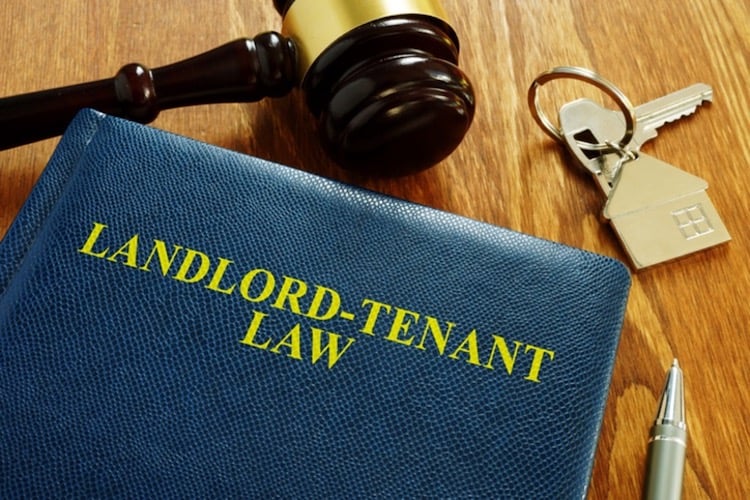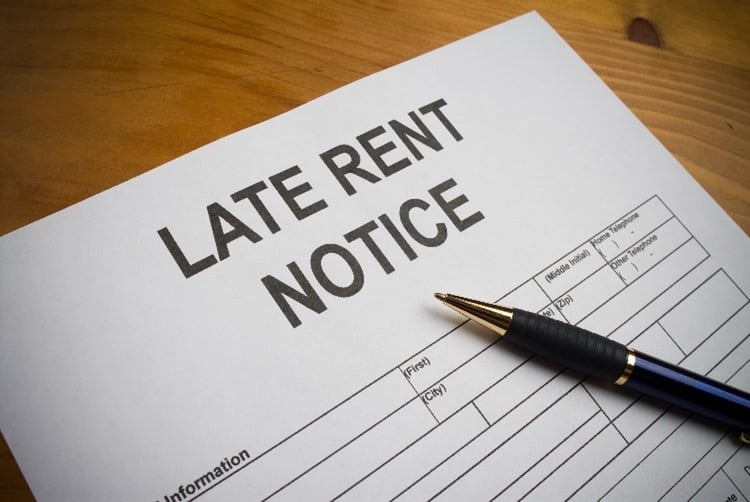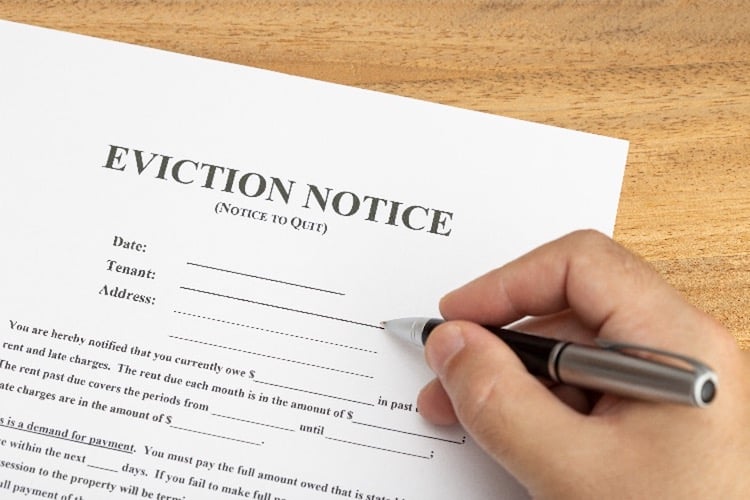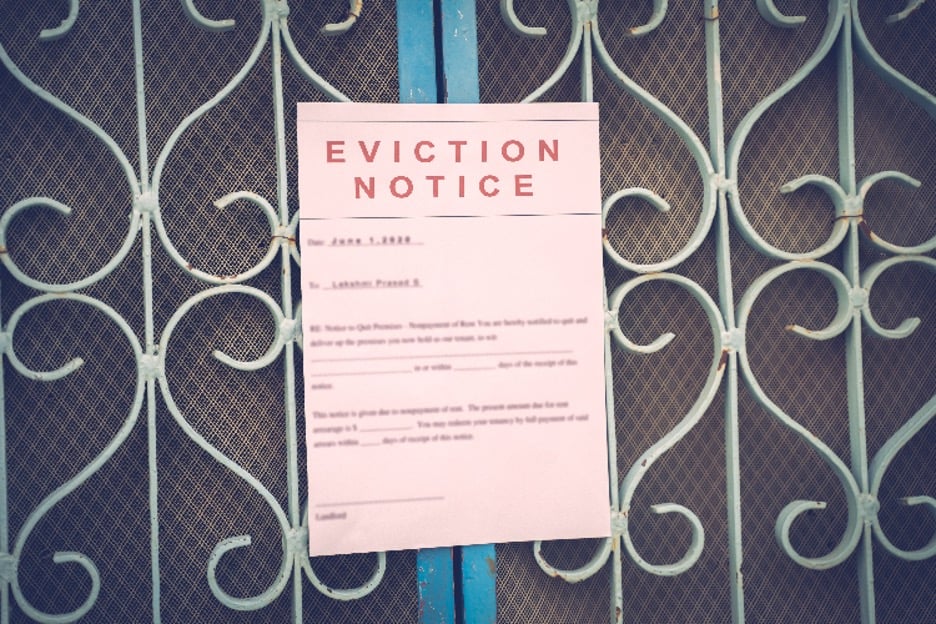Having a tenant not paying the rent and refusing to leave just might be the worst nightmare of every real estate investor. The property isn’t generating any rental income, yet you can’t simply lock the tenant out, remove their personal belongings, and take back your home because you’ll be breaking the law.
Fortunately, there are several good ways to deal with a non-paying tenant who refuses to vacate. In this article, we’ll explain what a landlord can and should not do, and discuss ways to reduce the risk of renting to a problematic tenant again.
How to Deal with a Tenant Not Paying Rent
There are a number of reasons why a tenant might stop paying the rent.
If it’s the first time your tenant has paid late, they may have simply forgotten it was the 1st of the month. In that case, a quick phone call followed up by a late rent notice will probably be enough to bring the tenant current. Other times, the reason for a tenant paying late or not paying the rent at all might be more serious.
Here are the steps to take to learn why a tenant isn’t paying the rent, so that you’ll have a better idea of which measures to take, such as offering cash for keys or beginning an eviction:

1. Know Your Rights (and the Tenant’s)
Both you and your tenant have rights, even when the tenant is not paying the rent. The first step in dealing with a tenant not paying the rent is by “getting your ducks in a row” to know what your rights as a landlord are.
The legal resource website Nolo.com publishes a list of state landlord-tenant laws to help understand your rights as a landlord, and the legal rules to follow when evicting a tenant and security deposit limits.
You can also learn more about landlord-tenant rights by speaking with your local property manager or with a real estate attorney who specializes in residential evictions. Websites such as Avvo and LegalMatch are two good online resources to find an attorney, along with asking for a referral from members of your local real estate investors group or your state’s bar association.
2. Speak with the Tenant
Once you understand everyone’s rights, the next step is to speak with your tenant. Some landlords prefer to talk by phone, while other property owners think speaking face-to-face works best when the tenant hasn’t paid the rent. It can be a good idea to email or text with the tenant at this point, as you will have a record of exactly what was said.
Whatever you do, don’t drop by the property unannounced. States have laws on a landlord’s access to rental property. Usually, a landlord is required to give the tenant notice before entering the property, usually 24 to 48 hours in advance of your visit.
If you do speak with the tenant in person, consider meeting in a neutral location such as the local coffee shop, to help avoid the conversation from becoming confrontational. Ask the tenant to explain why the rent hasn’t been paid, and when you can expect payment in full, including any late rent fees that have been charged. Make sure the tenant understands the ramifications of not getting caught up on the past due rent, such as a negative mark on their credit report and an eviction.

3. Send a Late Rent Notice
Follow up on your conversation with the tenant by sending a late rent notice. A written late rent notice describes the past due rent, including any late fees, and the deadline for paying the rent in full after allowing for any grace period.
Sending a late rent notice (sometimes known as an eviction notice, or a 3-day notice to pay or quit) is also the first step in the eviction process.
A late rent notice letter notifies the tenant that they have up to 5 days or the number of days allowed by your state landlord-tenant laws. If the tenant doesn’t pay in full, they must immediately vacate the property.
In order to use the late rent notice in a pending eviction, you’ll need to prove the notice was delivered to the tenant.
Many landlords and property managers will post the notice on the tenant’s door and also send the late rent notice by certified delivery, return receipt requested, or hire a process server to deliver the notice in person to the tenant.
4. Offer the Tenant Cash for Keys
Paying the tenant to leave when they owe you money might seem counterintuitive, but in some cases, cash for keys can make good business sense. That’s because the cost of a residential eviction can be between $4,000 and $7,000, depending on the type of property and where the rental home is located.
Offering to pay for your soon-to-be ex-tenant’s first month of rent or moving expenses could be much more cost-effective than moving forward on a costly eviction. If the tenant accepts your offer, have your property manager or lawyer draw up a simple agreement for both you and the tenant to sign.

5. File for an Eviction
When a tenant isn’t paying the rent and refuses to willingly leave, the remaining option is to file for an eviction.
At this point, many landlords hire a real estate attorney who specializes in residential evictions. Many cities have attorneys who handle evictions for a flat fee (excluding court costs), and they know exactly how the eviction process in the state works.
After you pay your filing fee, the court clerk may ask for a copy of the late rent notice delivered to the tenant, proof of delivery, and documentation that the tenant received the amount of time allowed by law to cure the violation and pay the rent in full.
Once the clerk is satisfied that the proper process has been followed, a hearing will typically be scheduled. You or your attorney will need to provide the court with documents, including the original executed lease, rent payment records, copies of correspondence between you and the tenant, and evidence that you tried in good faith to work with the tenant.
Oftentimes, the tenant will not show up for the eviction hearing, and a judgment will be rendered in your favor. If the tenant does appear, the judge will hear both sides of the story.
Provided that you’ve followed all of the rules for evicting a tenant in your state and you’ve provided the court with evidence of a breach of the lease for nonpayment, you will likely receive a ruling in your favor and a Writ of Restitution. The writ is sent to local law enforcement, such as the sheriff or constable, who will visit the property and physically remove the tenant if need be.
6. Collect on Your Judgment
The court may also award you with a judgment against the tenant for any unpaid rent, late fees, and court costs (depending on how your lease is written and state law).
Many landlords hire a collections agency to collect from the tenant. The agency may engage in collection efforts, file the judgment with the credit bureaus, track down the tenant if they have fled to another state, and seek to garnish the tenant’s wages and assets until you have been paid in full.

Can You Sue a Tenant to Collect Back and Unpaid Rent?
There are two common situations when a landlord may choose to sue a tenant to collect back and unpaid rent.
The first is when the tenant has a long-term lease (usually for a 12-month term) and breaks the lease and stops paying the rent before the lease term expires. The second circumstance for suing a tenant for nonpayment of rent is when the lease is month-to-month and the tenant leaves without providing the required notice.
Whether or not to actually sue a tenant for unpaid rent is a business decision a landlord needs to make. In some cases, it may not be worth the time, trouble, and expense to take the tenant to small claims court for one month of unpaid rent.
On the other hand, if a tenant breaks a long-term lease agreement with several months remaining, a landlord may be able to sue for:
- Unpaid rent while the tenant occupied the property
- Rent due for the remaining term of the lease (less rent recovered by re-renting the home)
- Court and eviction costs
- Repair expenses to fix damages caused by the tenant
As a rule of thumb, many landlords only sue a tenant if they can locate the tenant, believe they can win the case, and have a reasonable likelihood of collecting money owed by the tenant without the tenant filing for bankruptcy.

How to Find Good Tenants
Having a tenant who fails to pay the rent can happen to every landlord from time to time. However, there are certain things you can do to improve the odds of finding a good tenant who will be conscientious about paying the rent.
Begin with the Roofstock Neighborhood Rating Checker to understand the demographics of the neighborhood your home is located in. By reviewing data such as the median income range and employment level of the area, you’ll be better able to set reasonable criteria for accepting or declining a prospective tenant.
Now that you know what to expect, the next step in finding good tenants is to reach as many prospects as possible as quickly as possible.
Online rental listing and tenant screening websites such as Avail and Zillow Rental Manager reach millions of prospective tenants each month. The more applicants you have to choose from, the greater the odds can be that you’ll find a qualified tenant for your property.
Most rental listing and tenant screening sites are free to use. They make their money by charging applicants a small fee to apply, and for generating landlord reports including:
- Credit and background checks
- Rental history reports
- Identity verifications
- Criminal and sex offender reports
Finally, consider making your property pet-friendly to attract more interest and help keep occupancy levels high.
According to The Humane Society, landlords who accept tenants with pets see applications from qualified renters dramatically increase, with tenants staying longer and keeping turnover costs between renters lower.
Final Thoughts
There are a number of steps a landlord can take when a tenant stops paying the rent and refuses to leave. Sometimes, meeting the tenant face-to-face and explaining how a potential eviction will affect their credit report is enough to get the tenant to vacate. Other times, landlords offer the tenant cash for keys as an incentive to leave.
If you do need to file an eviction, be sure to follow your state landlord-tenant laws and consider hiring a real estate attorney who specializes in residential evictions. After you obtain a judgment against the tenant and regain your property, fine-tune your tenant screening process to reduce the risk of renting to a non-paying tenant again.









